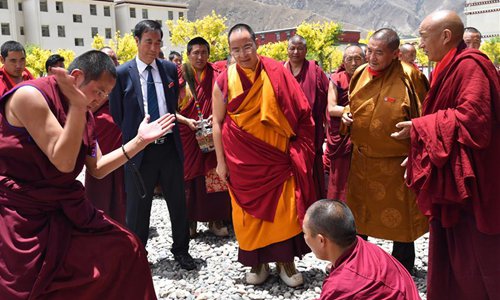By Sun Haoran and Zhang Han
Groups aim to disturb Tibet’s social stability, prosperity: expert

China has intensified its crackdown on gang crimes in Southwest China’s Tibet Autonomous Region as the country enters a key year in its strictest national campaign, while analysts said such crimes are usually related to separatist forces in the region.
Zhu Weiqun, leader of an inspection team sent to Tibet, said at a briefing that the campaign against gang crimes in Tibet had made progress, according to a statement released on the Lhasa government website on Tuesday.
Zhu call for the people to be mobilized further and to increase their legal awareness; improve the procedure of cases related to gangs and establish an effective mechanism to deal with unregulated activities in different sectors
The inspection team to Tibet was among the ten sent by central authorities from late May to early June to provincial-level regions, including Beijing, Shaanxi and Heilongjiang, marking the inspection coverage of all provincial-level regions in China, the Xinhua News Agency reported.
China launched a three-year campaign against gang crimes in January 2018.
According to the plan, the target of this year’s campaign is to pull out the crimes’ roots.
As for Tibet, overseas secessionists may be the root of some gangs, Xiong Kunxin, a professor at Tibet University in Lhasa, told the Global Times on Tuesday.
Local gangs collude with and receive support from overseas separatist forces. These gangs differ from normal ones because they aim to disturb the region’s social stability and prosperity rather than make money, Xiong noted.
Zhu noted at the briefing that cracking down on gang crimes in Tibet should be integrated with the fight against separatist forces, according to the Lahsa government website.
However, he told the Global Times on Tuesday that the campaign in Tibet is aimed at people involved in organized crimes, which is no different from those in other parts of China, in response to some foreign media reports that groundlessly implied that the campaign in Tibet is targeted at people with religious beliefs or with ethnic backgrounds.
“We strongly oppose and resolutely crack down on any separatist force in the name of ethnicity or religion, which are mainly organized by the Dalai clique,” he noted.
A work report from the head of Tibet’s High People’s Court in January said that 360 people in 268 cases were found guilty during the region’s crackdown on gang crimes in 2018.
Another 25 people were also punished for inciting separatism or financial crimes which jeopardized national security. Source:Global Times

